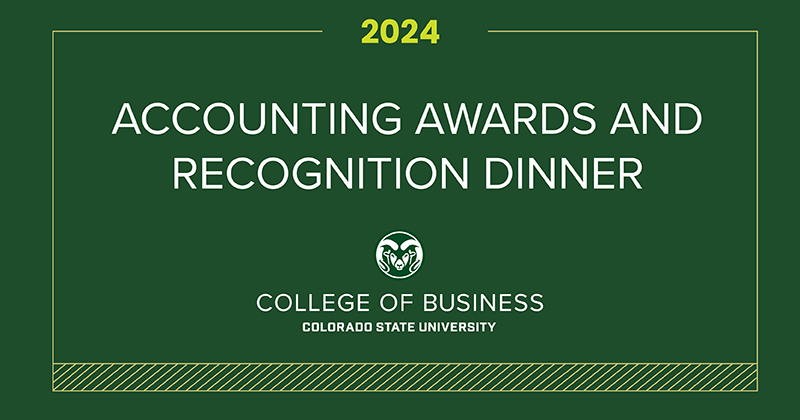
The Department of Accounting at Colorado State University’s College of Business inducted four accomplished alumni into its Hall of Fame on April 23 during its annual Accounting Awards and Recognition event.
The alumni – Tom Kenning, Tammy Rivera, Andy Weidman and Cheryl Zimlich – all received the Distinguished Department of Accounting Alumni award.
The annual event is an opportunity for the Department of Accounting to bring together alumni, faculty, students and friends to celebrate the community’s successes. Learn more about this year’s inductees below.
Tom Kenning, retired chief administration officer of Alpine Bank (class of 1983)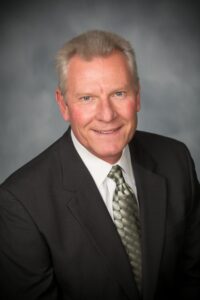
“I feel so fortunate that community banking really combines a technical skill and technical abilities with a retail environment, so you just never knew who was going to walk through the door and what they needed and how you might be able to help them and what their story might be.”
Nearly a decade into his career in banking, Tom Kenning got the itch to be an entrepreneur. After graduating with a bachelor’s degree from the College of Business, Kenning took a job at FirstBank, working in the Denver Tech Center area. He quickly advanced from management trainee to executive vice president, but something was missing.
“I grew up in Littleton, so working in the Tech Center, I was only about five miles away from where I’d grown up,” Kenning said. “I thought, ‘There has to be more to life than southeast Denver.’”
Inspired to make a change, Kenning and his wife, Tammy, bought a hotel in Ouray, a tiny town near Telluride in the San Juan Mountains, in 1991.
Just two years later, Kenning returned to banking, becoming executive vice president at the Bank of Telluride, but by then, he and his family had fallen in love with Colorado’s Western Slope, and they never left. For the next three decades, Kenning devoted his career to community banking in small mountain towns across Colorado.
“I feel so fortunate that community banking really combines a technical skill and technical abilities with a retail environment, so you just never knew who was going to walk through the door and what they needed and how you might be able to help them and what their story might be,” Kenning said.
At the time that Kenning took the job at the Bank of Telluride, it was the town’s only bank, but in 1995, he joined the newly chartered First National Bank of Telluride. Under his leadership, the bank grew tenfold in ten years, expanding from a single location with $15 million in assets to four locations with $160 million in assets.
When First National Bank of Telluride sold to Alpine Bank in 2005, Kenning became a regional president and director of the bank, and in 2009, he moved to Carbondale, near Alpine’s Glenwood Springs headquarters, to oversee back-room operations of the $2 billion dollar bank. Kenning was named chief operations officer in 2013, and he retired in 2022 as chief administration officer. He remains on Alpine’s board of directors.
Despite his career success, Kenning’s proudest moment isn’t directly tied to the banking industry.
In the late 90s, the Grand Junction-based St. Mary’s Regional Hospital opened a clinic in Ridgeway, a small town not far from Ouray.
There weren’t many options for medical care in Ouray County, so the clinic quickly became a vital resource. A couple years later, the hospital announced it would be closing the clinic, so Kenning joined a small group of people who wanted to save it.
Over the course of 18 months, they created a special district, passed a tax to help fund the clinic, bought the building in which the clinic was housed and then negotiated with the hospital to give them the clinic’s equipment in exchange for getting the hospital out of its lease.
“The day that the clinic opened as the new entity, everything was exactly the same as the old clinic,” Kenning said. “The only thing that was different was the sign, but the building was the same, the equipment was the same, the doctors were the same, they had all the records, so from a community standpoint, if you walked in, it felt just like it did when you were going there with Saint Mary’s.”
Kenning was named president of the special district, an elected role in which he served for eight years.
“Saving the clinic and allowing it to operate in a small town and providing such an important service was a huge win, and obviously my business background and accounting knowledge played a huge part in being able to navigate all of that,” Kenning said. “I don’t think I could have done it without the background that I had.”
Working to save the clinic was just one of the ways in which he gave back to the small towns where he built his career.
“I feel really fortunate that I’ve gotten a lot out of these small towns, so to give back just seems natural,” he said. “A lot of times, if people don’t get involved, things simply don’t happen. That’s not really the way in the big city – they can almost always find somebody else to do something else – but in a small town, if people don’t raise their hands, it just doesn’t get done. I truly feel that if you’re good to your community, they will be good to you. It’s not, ‘I’m going to do this because I know I’m going to get something out of it.’ It’s, ‘I’m going to try to make this community better because I live here, too.’”
Tammy Rivera, managing partner of FORVIS’ Colorado and Salt Lake City offices (class of 1999)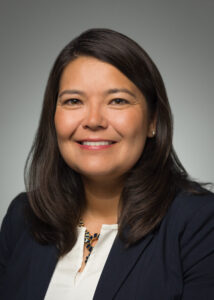
“I can have a calendar full of appointments and my day may not even look anything like I thought it would, and that, to me, is absolutely thrilling. I love that I never know what the next challenge is going to be, and I love the fact that my clients can call me one day with their hands thrown up in the air and not have any idea how they’re going to resolve an issue, and we can come alongside them and help them do what they thought was impossible.”
Reflecting on her career so far, Tammy Rivera says that above all, she’s had a lot of fun. After 24 years in the field, she still loves “the beautiful chaos that is public accounting” just as much as she did at the start.
“I can have a calendar full of appointments and my day may not even look anything like I thought it would, and that, to me, is absolutely thrilling,” Rivera said. “I love that I never know what the next challenge is going to be, and I love the fact that my clients can call me one day with their hands thrown up in the air and not have any idea how they’re going to resolve an issue, and we can come alongside them and help them do what they thought was impossible.”
Growing up in Sterling, a small town in Northeast Colorado, Rivera got her first glimpse into the world of accounting while helping in her best friend’s father’s office. He was a tax partner at a small firm, and during busy seasons, the girls would help him around the office, emptying the trash and shredding papers. Rivera had always liked math, and she quickly found herself drawn to accounting.
“I just always thought it was just a very honorable and noble career,” Rivera said. “I liked the fast pace of the work and that you never know what your day is going to look like.”
Rivera was a first-generation college student and didn’t have much money for school, so she started at Northeastern Junior College and then transferred to CSU’s College of Business. She worked full-time while studying at CSU, and although she didn’t always have time for extracurricular activities, she felt “a sense of belonging” at College of Business. She was also grateful to have received the University’s First Generation Award, which was a “game changer” that helped defray the costs of attending CSU.
“I just think that creates opportunity for folks – not everyone always has the means, and to have a lifeline like that thrown out is pretty amazing,” Rivera said. “It’s the difference between graduating with mountains of debt versus maybe a molehill of debt.”
Once Rivera arrived at the College of Business, it was the accounting classes that resonated with her the most, leading her on an “organic” path into the field.
“I think it’s those little micro spots throughout your journey,” she said. “You keep following the little breadcrumbs, and it almost chose me versus me choosing it.”
Rivera got her start at BKD – now FORVIS – after going through an on-campus recruiting process with several public accounting firms. She started full-time at the company’s Colorado Springs office in January 2000, and she’s climbed the ranks over the years, making partner in 2017 and then moving to Denver in 2022 to become managing partner of the company’s Colorado and Salt Lake City offices.
As a healthcare auditor and consultant, Rivera has worked with a wide variety of organizations – from small, rural facilities to large hospital systems – across Colorado, New Mexico, Arizona, Wyoming, Montana and Utah.
“I’ve really found a passion in serving organizations that are invested in the health and wellbeing of others,” Rivera said. “It’s been awesome to be able to work in a space that I am passionate about and is core to everyone’s day to day.”
The fact that Rivera has spent the entirety of her career at the same company is a testament to the investment that company leaders made in her, she says. Over the years, she’s had countless opportunities to hone her skills and take on leadership roles.
“I always knew people were invested in my personal and professional growth, and I could share a thousand different stories,” Rivera said. “You have those inflection points in your career where you can go left or you can go right. I knew I could trust my leadership to help me navigate those choices, and they all led me to here, so I’ve been very grateful and fortunate to be here.”
Now, as a leader in the organization, she’s proud to be making her mentors proud – and grateful for the chance to give back.
“That’s probably the proudest piece for me: I know that I’ve taken the tools that I have been given by lots of folks investing their time in me, and I don’t know if I’ve reached my full potential, but I feel like I’ve been doing what they thought I was capable of the entire time,” Rivera said. “Now, it’s my opportunity to help the next person become partner, to really pay it forward.”
Andy Weidman, retired CEO of RKL LLP (class of 1987)
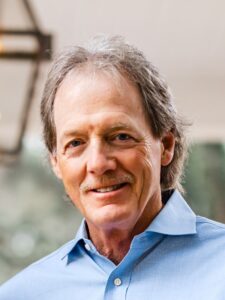
“I’m a big advocate of the profession. I think it’s challenging work, I think it’s interesting work and more importantly, I think it’s important work.”
Accounting runs in Andy Weidman’s family. Weidman’s father was a CPA, and although he never pressured Weidman to follow in his footsteps, it was a path that aligned with Weidman’s interests and aptitude for math.
“Growing up, I got to see him working, and I saw a guy that enjoyed what he did, had some fun working, felt he did something that was meaningful and interesting, was well respected in the community and, from where I sat, it looked like he made a pretty good living,” Weidman said. “I don’t know if I was predestined to be an accountant, but when I took accounting classes, I actually liked them. They were hard but interesting to me.”
Nowadays, accountants surround him. Weidman’s wife is a CPA, and so are his son, his daughter and his daughter’s spouse. His wife’s two sisters are CPAs, too. His brother didn’t get the CPA bug, but his brother’s son did.
“Thankfully, my daughter-in-law is not,” Weidman joked. “She has her marketing MBA, so we feel like she gives us some nice diversity in our family, so we’re not just all CPAs.”
Weidman earned his bachelor’s degree in accounting from Penn State University in 1978, then moved to Denver to work at Touche Ross. He spent two years in the company’s audit department and one in its tax department before he decided to get his master’s degree in tax at CSU’s College of Business.
“I always felt that I got a great foundation for a successful career with my bachelor’s degree in accounting from Penn State, but what I learned at Colorado State that year I spent working on my master’s was really the catalyst to what I think ended up being a pretty great career,” Weidman said.
Weidman returned to Touche and stayed there until the end of 1984, when he briefly left public accounting to become tax director at Central Bancorporation. When the bank was sold in 1989, he moved back to Pennsylvania and joined Ernst & Young as a senior manager. After two years there, he joined Reinsel & Company (now RKL).
“After 26 months at Ernst & Young, that was enough, because I realized I really enjoyed working with privately held businesses much more than public companies,” he said.
He spent the rest of his career at RLK, where he served in a variety of roles, including wealth management president, board chairman and CEO, before retiring in 2018. In 2006, he was named a “Top 100 Most Influential Practitioner” by Accounting Today.
Outside of the office, Weidman is most proud of serving as president of the Pennsylvania Institute of Certified Public Accountants (PICPA) – one of several professional organizations with which he was involved.
“I’m a big advocate of the profession,” Weidman said. “I think it’s challenging work, I think it’s interesting work and more importantly, I think it’s important work. So, that was a real thrill for me.”
He initially got involved with PICPA to expand his network after moving back to Pennsylvania, but he stuck around for 26 years.
“Being president of the PICPA was a pretty special time for me,” Weidman said. “At a time when a lot of people don’t necessarily think public accounting is a great career or a fun career or interesting or challenging, it was interesting for me when I traveled around the state and talked to all the CPAs, they’d say things like, ‘Jeez, my kids would never want to be a CPA,’ and I’d say, ‘Well, how are you projecting that when you come home? Interestingly, both of my kids are CPAs.’”
Weidman’s PICPA service allowed him to follow in his father’s footsteps once again: At one point, Weidman was president of the local chapter of PICPA, a position his father also held.
Weidman also volunteered extensively for several nonprofits, including local chapters of the Boys & Girls Club and the United Way – and he strongly encouraged his employees to do so, too. Every partner at RKL was required to be involved in philanthropic organizations and be a leadership-level giver with the United Way.
“I think one of the things that we tried to do is to say, ‘Hey, if you’re going to live in this community and work in this community, you have to make it a better place to live,’” Weidman said. “Obviously we love to help our clients and take care of our employees, but it’s also important that we take care of our communities.”
Cheryl Zimlich, president and CEO of Bohemian Foundation (class of 1986)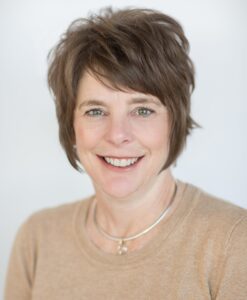
“What gives me the most pride is to look around when I’m out and about and say to myself, ‘I know the story about how that came about,’ whether it’s the fruits of the labor of the nonprofits that Bohemian supports or to know Bohemian played a role in bringing a program or project together by either funding, connecting or convening. I love being able to look back and think of the people and the organizations who are working really hard every day to make a world a better place, whether it’s here locally or across the globe.”
For the first 15 years of her career, Cheryl Zimlich worked as an accountant while volunteering in her spare time. Then, in 2001, she joined Bohemian Foundation, dedicating herself to her community full time. She now serves as the organization’s president and CEO, working behind the scenes to make Fort Collins a better place to live.
“The reason I really enjoyed and got a lot out of volunteering is that it was future-looking, and that was different from my day-to-day,” Zimlich said. “My day-to-day as a financial statement auditor was looking into the past. So, by doing this volunteering, I was future-looking in, ‘How could I help an organization be better or their results be better?’”
Some might be surprised by Zimlich’s career pivot, but to her, it makes perfect sense. She gets to be involved in the philanthropic work she’s passionate about while still drawing on her background in accounting.
“It’s not what I thought I would be doing back in 1986, when I graduated from CSU with a degree in accounting, but it’s kind of funny – even doing what I do, I use my accounting and auditing skills almost every day,” she said. As the head of a grant-making organization, she often examines things like the capacity of nonprofits to do their work and evaluates the size and scope of the grant.
After more than two decades with Bohemian Foundation, Zimlich is proud of what the organization has been able to accomplish.
“What gives me the most pride is to look around when I’m out and about and say to myself, ‘I know the story about how that came about,’ whether it’s the fruits of the labor of the nonprofits that Bohemian supports or to know Bohemian played a role in bringing a program or project together by either funding, connecting or convening,” Zimlich said. “I love being able to look back and think of the people and the organizations who are working really hard every day to make a world a better place, whether it’s here locally or across the globe.”
Zimlich’s father was a math professor at CSU, so before she began college, she had the opportunity to speak with faculty to help her decide on a major. She’d always been interested in math and science, so she started at CSU as a chemical engineering major. After a year, she decided it wasn’t the right fit. The summer after her freshman year, she took a few classes to explore other options and fell in love with accounting.
“I found it to be intuitive for me the way that I thought the sciences were going to be, and the professors in the College of Business were really wonderful to me in that period of exploration,” Zimlich said.
After joining the College of Business, Zimlich quickly took advantage of some of the opportunities available to students, including getting involved in Beta Alpha Psi and taking on a paid internship.
“When I switched my major to accounting, I really thought I was going to end up working locally in a manufacturing organization doing cost accounting because I had really loved cost accounting,” she said. “My professors said that I should really try one of these paid internships, and what was funny about that is they were all in public accounting.”
She landed an internship with Coopers & Lybrand, working on the Storage Technology Corporation bankruptcy in 1984. The experience changed her mind and shaped her career in accounting.
“That paid internship completely changed the trajectory of my career, and when I graduated, I ended up taking a job with Coopers in auditing,” she said.
She spent four years with Coopers & Lybrand in Denver, auditing financial statements, then returned to Fort Collins and worked for Sample & Bailey for seven years. She also spent several years as an independent consultant before joining Bohemian Foundation.
Reflecting on her career, Zimlich’s advice to students is to be open to possibilities.
“My advice to students is take advantage of all the opportunities that CSU and the College of Business have to offer,” Zimlich said. “Seize the moments; seize the opportunities. Just like myself, where you end up landing might not be where you start and look at that as a journey and an adventure and stay curious.”
She also encourages business students to consider nonprofit work as a possible career path.
“When you’re an accountant and have business acumen, don’t exclude a career in nonprofits,” Zimlich said. “The work that’s out there that nonprofits are working on is hard, but it’s critical to the way we think of a civil society, and nonprofits need those skillsets just like any other businesses do.”
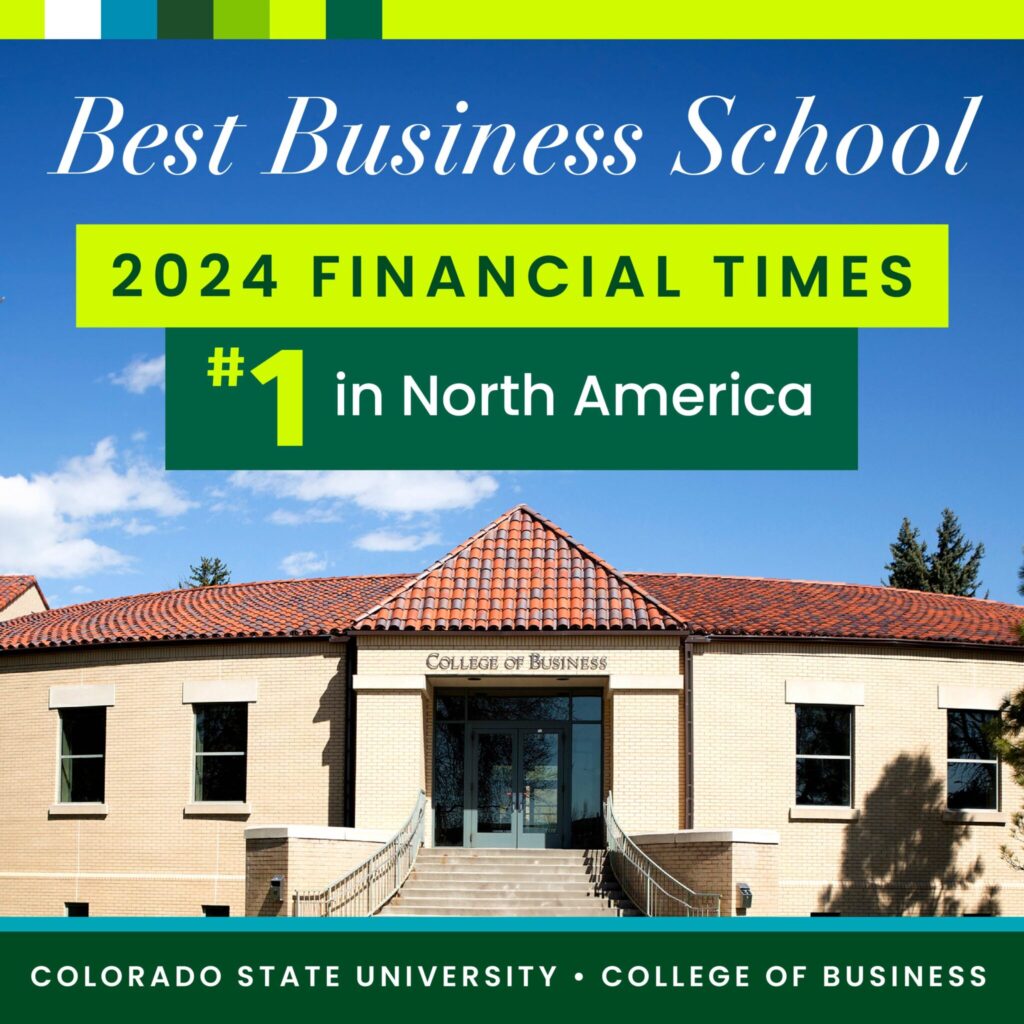
CSU’s College of Business is building a community of action-oriented leaders focused on using Business for a Better World through its leading-edge research, accessible education and top-rated undergraduate and graduate programs. Connecting the principles of people, planet, profit, and purpose across organizational business goals has earned the College global recognition, including being named one of five Best Business Schools in the world for responsible business education by Financial Times.